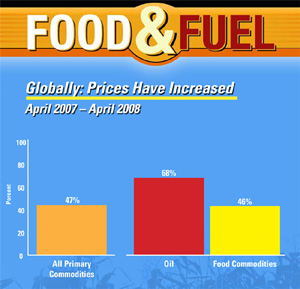Armed with power points and statistics, officials with the U.S. Department of Agriculture held a press conference in Washington DC Monday to discuss the case for producing both food and fuel in the United States.
 “We think the time has come for USDA to join in the public conversation about the relationship between food prices and biofuels,” said Agriculture Secretary Ed Schafer. “We want to offer our perspective and what has happened in the marketplace, to share our data and the analysis of what has happened.”
“We think the time has come for USDA to join in the public conversation about the relationship between food prices and biofuels,” said Agriculture Secretary Ed Schafer. “We want to offer our perspective and what has happened in the marketplace, to share our data and the analysis of what has happened.”
Presenting the data was USDA chief economist Dr. Joe Glauber, who pointed out that all commodity prices have risen in the past year, not just food prices. “We certainly don’t want to minimize what’s going on with ethanol, because it is a very important factor in today’s market, but it’s important to discuss it in its proper context,” Glauber said. He noted that all commodities are up 47 percent, food is up 46 percent, and oil is up 68 percent.
The factors Glauber says have contributed to higher food prices are economic growth, weather, export restrictions, higher food marketing and transportation costs, and finally, increases in biofuels.
An economic analysis of the pass-through for an increase in corn prices on the Consumer Price Index (CPI) shows that a 50 percent increase in corn prices raises the CPI less than one percent, but Glauber says, “It’s a difficult thing to sort out how much of the increase in corn prices was necessarily due to ethanol.”
However, he says the Council of Economic Advisers estimates the total global increase in corn-based ethanol production accounts for only about three percent of the recent increase in global food prices.

